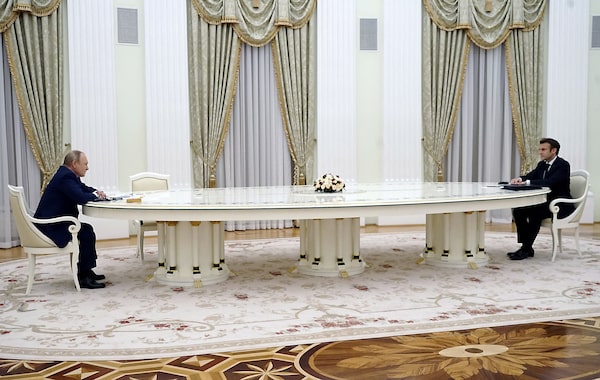
Russian President Vladimir Putin attends a meeting with French President Emmanuel Macron in Moscow, Russia, on Feb. 7.Sputnik Photo Agency/Sputnik/Kremlin via REUTERS
Any hope that Vladimir Putin’s inner circle will rebel and oust the Russian president is extinguished in the first few minutes of Putin’s Road to War (Tuesday, PBS, 9 p.m., on Frontline).
There is footage of Putin’s surreal meeting with his national security council three days before the invasion of Ukraine. He enters cockily, makes remarks to his team sitting 30 feet away and then they stand up to make remarks. The head of Russia’s foreign intelligence service speaks, hesitating over words, and Putin berates and belittles him. “Speak plainly,” Putin sneers. Then he listens and tells the man, “Good, you can sit down now.” They’re all terrified, like quivering school children. “How scared they must be of him,” is one of the first comments from an array of experts on Putin and Russia. Yes, we can see that.
“He’s an unhappy man,” observes the Russian-American journalist Masha Gessen, who was fired from a job in Russia after declining to cover one of Putin’s man-of-strength photo-ops. The “unhappy” angle plays out in a familiar-to-some tale of Putin’s disappointment when the Soviet Union fell apart. We are given the anecdote about how, working for the KGB in East Germany, he asked Moscow for advice as the Berlin Wall was coming down, and there was no reply. Since then, he’s mourned the end of an empire and decided to recreate it. Maybe then he’ll be a happy man.
Catch up on the best streaming TV of 2021 with our holiday guide
What is more useful about the program is its coolly defined effort to connect the dots, to map out the past 20 years and reveal the literal path to this war, step by step. It benefits a lot from Russian voices who worked inside Putin’s Russia, rather than the usual array of TV pundits who crowd the current daily news coverage. Yevgenia Albats, an experienced reporter there, who has stayed on in Russia, says of Putin, “He’s a professional liar, he was taught to lie.” Gleb Pavlovsky, a former adviser to Putin who later become a sharp critic, describes the man as “angry” but believing firmly that, “everything could be manipulated.” Hence Putin’s obsession with television and the shaping of his own image.
Essentially, we are told, Putin believes in a narrative that has the United States meddling everywhere, from the breaking away of former Soviet countries to the Arab Spring movement. We see and hear Andrei Klimov, a current member of the Russian Senate, explain that the United States interfered everywhere and Russia is sick and tired of it. But the narrative switches back to perceptions about Putin’s personal obsessions and state of mind. We’re told he brooded long on the end of the Muammar Gaddafi regime in Libya and became afraid that Gaddafi’s brutal, ignominious end might be his own looming fate if he did not cement Russia’s power in the world.
A central thread is the West’s inability to handle Putin’s actions in any coherent way. We are asked to make our own connections. The Winter Olympics in Sochi in 2014 were a triumph for Putin, an expression of his personal stature and an emanation of Russia’s claim to world-power status. The event seems to have spooked other leaders into showing respect when, in fact, Putin simply lied and denied when confronted about Russia’s actions in Crimea and in eastern Ukraine.
Antony Blinken, now the U.S. secretary of state, says Putin evaded questions from Barack Obama. When confronted, Putin just said, “What are you taking about?” and moved on. Baffled and unsure, it seems, numerous U.S. officials hesitated, over and over. Evelyn Farkas, then at the Pentagon, and someone who seems to have become deeply cynical about Putin, says declining to stand up to Russia was a grave mistake.
Eventually, the program becomes unnervingly about recent U.S. politics. Having been paranoid about U.S. interference in eastern Europe, the Kremlin was eager to interfere, undermine Hillary Clinton’s presidential campaign, and did so with glee. And the election of Donald Trump – unexpected in Moscow, we’re told – simply added gloss to Putin’s image in Russia. Now people believed he was so powerful he could determine U.S. elections. As former national security adviser Stephen Hadley says of Trump, “What’s not to like, if you’re Putin?”
In the end the conclusion is that Putin sees the United States as “a nation so divided that it’s paralyzed.” Perhaps. But with this admirably clear-eyed PBS program what you take away is those people who surround Putin, paralyzed by fear of him.
Plan your screen time with the weekly What to Watch newsletter. Sign up today.